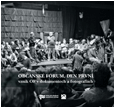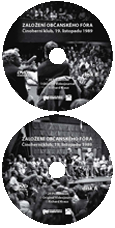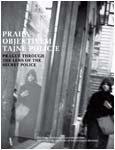Monographs
Our publications can be purchased in bookstores or at the Institute’s Ján Langoš library in the Czech Republic, or in the Czech-language at: www.kosmas.cz. For international orders in English, please write: [email protected], [email protected].
Petr Blažek: Ryszard Siwiec 1909–1968
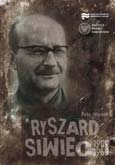 |
The Czech-English publication, published jointly by the Institute for the Study of Totalitarian Regimes of the Czech Republic and Poland’s Institute of National Remembrance, offers all basic materials available about Ryszard Siwiec, a 59-year-old Polish citizen, who committed self-immolation in a Warsaw stadium on September 8, 1968 in protest against the August Occupation of Czechoslovakia by armies of Warsaw Pact countries and the participation of the troops of the Polish People’s Republic in the invasion. Alongside Jan Palach’s protest, the self-immolation of Ryszard Siwiec is one of the best described and most documented. This has made it possible to explore the issue of the motivations of not only of Siwiec but also the others who chose this form of protest. In my opinion, their aim was not merely pure protest. Ryszard Siwiec, Jan Palach et al decided to undergo enormous suffering and sacrifice their lives in order to shake others up in such a way that they became aware of the monstrosity of the evil around them, to galvanise them into action and into defending values that had been violated. In so doing they not only helped bring about the fall of dictatorships – they also changed the consciousness of others. From Łukasz Kamiński‘s Foreword Istytut Pamieci Narodowej, ÚSTR, Prague 2015, 1st edition, bound publication, 248 pages, ISBN 978-83-7629-847-4 (IPN), ISBN 978-80-87912-33-1 (ÚSTR) |
Czechs and Slovaks in the 20th century. Cooperation and conflicts 1914-1992
(Češi a Slováci ve 20. století. Spolupráce a konflikty 1914–1992)
Jan Rychlík
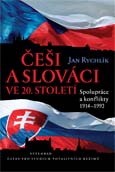 |
Czechoslovakia, the state in which a majority of contemporary Czechs and Slovaks spent the greater portion of their lives, now belongs to history. The relations between the two nations, which for more than seven decades gathered with this state as their home, have remained vigorous and intimate. Historian Jan Rychlík’s book, appearing for the first time in a collaberative publication, aims chiefly to introduce Czech readers to the neglected „other side“ of Slovakian politics and their particular characteristics during the period of the united state. His erudite and meticulous account, beginning with the Austo-Hungarian Empire and the first world war, follows the progression of Czech-Slovak relations primarilly in the political realm and the gradual strengthening of autonomist tendencies in Slovakian politics, culminating in the breakup of Czechoslovakia after Munich and the creation of an independent Slovakian state. Author reserved enough space to the most famous actors of the Slovak politics of this period – Andrej Hlinka, Milan Hodza and Jozef Tiso. The second half of the book is devoted to policy in the people´s democratic Czechoslovakia, on the way from the centralization to the federation, and during the Husák´s normalization. The final chapter discusses the twists and turns of the disintegration of Czechoslovakia and formation of two new separate units on the map of Europe. The work of Jan Rychlík, based on a large number of archival materials, is an unique contribution to our recent and still live past. Vyšehrad, ÚSTR, 1st edition, bound publication, 677 pages, ISBN 978-80-7429-133-3 (Vyšehrad), ISBN 978-80-87211-59-5 (ÚSTR) This book is available only in Czech. |
They Called Him Old Man. A Story of Anti-communist Groups Bayer et al.
(Říkali mu Dědek. Příběh protikomunistické skupiny Bayer a spol.)
Martin Tichý
 |
Martin Tichý’s book „They Called Him Old Man: A Story of Anti-communist Groups Bayer et al.“ offers a partial analysis of anti-communist activies in Czechoslovakia from the 1940’s to the 1950’s. The example of the Tabor group Bayer et al. analyzes the reasoning and motives that drove opponants of the Communist Party of Czechoslovakia to participate in anti-regime activities. The book attempts to offer a balanced perspective on the problematic that, in our time, is becoming a subject of frequently irrelevent and emotionally charged polemics. ÚSTR, Prague 2011, 1st edition, bound publication, 218 pages, ISBN 978-80-87211-56-4 This book is available only in Czech. |
Brigade General Josek Bartík. Intelligence Officer and Participant in the First and Second Czechoslovak Resistance
(Brigádní generál Josef Bartík. Zpravodajský důstojník a účastník prvního i druhého československého odboje)
Pavel Kreisinger
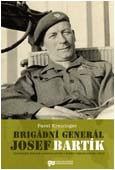 |
This monograph engages with the complicated fate of the life of brigade General Josef Bartík (1897-1968), an officer from František Moravec’s so-called „intelligence eleven.“ The book focuses on Bartík’s activies in the Czechoslovak army from 1918 – 1945, during the interwar period and during the Second World War in Poland, France, and Great Britian. In addition to this, it also captures his earlier activity in the Czechoslovak legions and in Italy during the Great War. Not even Bartík’s post-war fate could be avoided and he was prosecuted after February 1948 as a leading intelligence officer. The text is accompanied by a large number of pictorial appendices and documents not only limited to descriptions of Bartík’s army career, also capturing aspects of his domestic and civil life. ÚSTR, Prague 2011, 1st edition, bound publication, 192 pages, ISBN 978-80-87211-55-7 This book is available only in Czech. |
Prokop Drtina. The destiny of a Czechoslovak democrat
(Prokop Drtina. Osud československého demokrata)
Ondřej Koutek
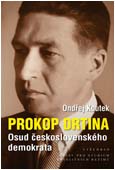 |
It is possible to say without too much exaggeration that everyone interested in our most recent history has read Prokop Drtina’s memoir called Czechoslovakia, my destiny (Československo můj osud). In these recollections, the former minister of justice, one of the leading exponents of democratic politics in the period before February 1948, recorded watershed moments in Czechoslovak history. These were events in which he himself was a participant. This book by historian Ondřej Koutek follows the fate of the politician, whose life almost completely overlapped the period in which Czechoslovakia was in existence. The author devotes attention to every period of Drtina’s life. He begins with the First Republic, when the young member of the National Socialist Party entered the service of President Beneš. After the Munich Agreement, Drtina was involved in the resistance, and he became an active member of the country’s political representation after escaping into exile. Under the pseudonym Pavel Svatý, he also became a well known and popular figure in foreign broadcasts. The peak and turning point in Drtina’s political career came in the three years after the Second World War, when he served as justice minister in the Czechoslovak governments of that time. His fate after the communist putsch in 1948 was dramatic – after attempting suicide by jumping out of a window, he was arrested. He was imprisoned until 1960. After some not very successful attempts at rehabilitation, he was an active dissident during the “normalisation” era. Ondřej Koutek’s book is based on a great number of sources. It is a contemporary portrait of a democrat and a man who was publicly active during all the relevant regimes. As such, it is also a history of Czechoslovak democracy. Vyšehrad, ÚSTR, Prague 2011, 1st edition, bound publication, 440 pages, ISBN 978-80-7429-069-5 (Vyšehrad), ISBN 978-80-87211-50-2 (ÚSTR) This book is available only in Czech. |
The 1968 invasion. The Russian perspective
(Invaze 1968. Ruský pohled)
Josef Pazderka (ed.)
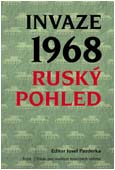 |
The 1968 invasion. The Russian perspective is a book that represents the first attempt to take a more coherent look at the Russian perception of the Prague Spring and the occupation of 1968. It describes the kinship that the Soviet liberal intelligentsia and dissident movement, which emerged while Brezhnev was tightening the screws, felt toward events in Prague, which for them represented one of the last hopes for change. The publication also presents Soviet journalists living in Prague who supported the changes in what was then the Czechoslovak Socialist Republic and subsequently paid for their stance by being deported and losing their job. The book looks at Soviet soldiers who came to Czechoslovakia. In interviews with them and in other texts, it depicts their inner world and the mighty machinery of the Soviet propaganda to which they were exposed. The book is accompanied by the photographs of Josef Koudelka, Karel Cudlín, Paul F. Goldsmith, Miroslav Žumpík and other authors. It also has unique and previously unpublished pictures from the private archives of Soviet soldiers and journalists. Torst, USTR, Prague 2011, 1st edition, bound publication, 272 pages. ISBN 978-80-7215-414-2 (torst), ISBN 978-80-87211-49-6 (ÚSTR) This book is available only in Czech. |
Revolution on the agenda of the day. The critical theory of the Frankfurt School and its reception in the German leftwing protest movement of the 1960s. The Red Army Faction and the German Green Party: a discursive analysis
(Revoluce na pořadu dne. Kritická teorie Frankfurtské školy a její recepce v německém protestním levicovém hnutí šedesátých let dvacátého století, Frakci Rudé armády a německé straně Zelených: diskursivní analýza)
Martin Valenta
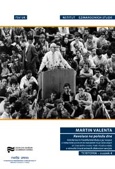 |
The work of Martin Valenta highlights the theoretical roots and the Western and particularly West German movement of 1968. For this purpose, he uses a receptive analysis of the critical theory of the Frankfurt School, whose neo-Marxism influenced the character of 1968 in the West and gave rise to a political and social movement. For Czech readers, it offers a unique look at the issue of Western neo-Marxism and its influence on society and politics on the western side of the Iron Curtain. UK FVS IMS, MATFYZPRESS, USTR, Prague 2011, 1st edition, bound publication, 320 pages, ISBN 978-80-7378-153-8 (MATFYZPRESS), ISBN 978-80-8721148-9 (ÚSTR) This book is available only in Czech. |
Rudolf Beran and His Era
(Rudolf Beran a jeho doba)
Jaroslav Rokoský
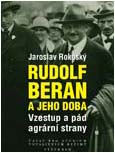 |
Rudolf Beran (1887-1954), first republic Chairman of the Agrarian Party and the Chairman of post-Munich Czech-Slovak Government, is one of the most tragic figure of our modern history. Extensive biography of the historian Jaroslav Rokoský offers more than just a biography of policy – his life is also the story of the rise and fall of political party with which was merged his fate. Author follows the Beran career from the beginning of the agrarian movement, the war and the post war process with the „traitors“ of the Republic. Book draws on critical moments in our modern history and opens up many „13th chambers“ to which we would like to forget. Vyšehrad, Institute for the Study of Totalitarian Regimes (ÚSTR), Prague 2011, 1st edition, bound publication, 912 pages, ISBN 978-80-7429-067-1 (Vyšehrad), ISBN 978-80-87211-47-2 (ÚSTR) This book is available only in Czech. |
For Our Freedom and Yours
(Za vaši i naši svobodu)
Adam Hradilek (ed.)
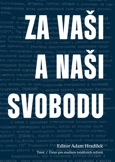 |
Life stories of citizens of the Warsaw Pact who protested against the occupation of Czechoslovakia under the slogan “For Our Freedom and Yours” in 1968. Stories come to live in an extensive set of interviews aimed to document a motivation, participation in the protests and consequences that the protesters had to bear or still bear. Many of them were thrown out of school and work, closed to prisons, labor camps, mental hospitals, sent into exil to Siberia,or forced to emigrate. Some of them paid the ultimate price for their bravery. This book was created so that they don´t fall into oblivion. The fates of protestants from Red Square, dissidents from East Germany, Poland, Bulgaria, and Hungary, complement historical studies describing response to the occupation of Czechoslovakia in countries that participated in this violent act. In the book you can find unpublished historical documents and photographs. Institute for the Study of Totalitarian Regimes (ÚSTR), 2010, 1st edition, bound publication, 472 pages, ISBN 978-80-87211-43-4 (ÚSTR), ISBN 978-80-7215-404-3 (Torst). This publication is available only in Czech. |
Štěpán Plaček. Life of intelligence fanatic in the service of Communist Party of Czechoslovakia
(Štěpán Plaček. Život zpravodajského fanatika ve službách KSČ)
Jan Kalous
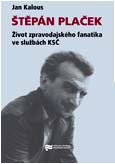 |
Štěpán Plaček (1909-1992) was one of the major actor of sphere of political intelligence of the Czechoslovak Ministry of Interior after the Second World War. Monograph deals with his career at the Ministry of Interior before February 1948 (including participation in the affairs of the period 1945-1948), also brings his young years , steadfast communist belief, imprisonment in the 50s years and life after his release to the 90s years. Parts of book are previously unknown documents and photographs from his inheritance. Institute for the Study of Totalitarian Regimes (ÚSTR), Prague 2010, 1st edition, bound publication, 428 pages, ISBN 978-80-87211-39-7 This publication is available only in Czech. |
They fought and died in Indochina. The first Vietnam War and Czechoslovaks in the Foreign Legion
(Bojovali a umírali v Indočíně. První vietnamská válka a Čechoslováci v cizinecké legii)
Ladislav Kudrna
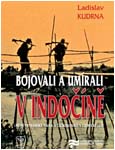 |
Ladislav Kudrna’s eighth book outlines an aspect of our modern history that has remained unknown until now. More than 2,000 young Czechoslovaks fought and died in the inferno of the first Vietnam War. Over 500 of them later fell on far-flung foreign fields. All of them were members of the French Foreign Legion. The author had materials at his disposal concerning 21 of these men, who were captured by the Vietnamese during some hard fought battles. After more than a year of hardship in prison camps, they were subsequently transported to the “people’s” democratic Czechoslovakia. The book is not only devoted to the combat deployment of these 21 Czechoslovak citizens, but also looks at what happened to them beforehand and what their subsequent fate was, i.e. why did these youngsters (many of whom were minors) escape abroad? Why did they enter the service of the Foreign Legion and what was their tough training in north Africa like? How was the course of the war itself and what conditions prevailed in Vietnamese labour camps? The repatriation of the captives to Czechoslovakia and the Czechoslovak government’s support for the Ho Chi Minh regime is also dealt with. The book looks at the treatment of these repatriates after their arrival in the country as well as how they were used for propaganda purposes or punished. Besides all of this, the publication will also give readers information on other aspects related to the given issue. The book is richly complemented with hitherto unknown photographs and archive materials. Institute for the Study of Totalitarian Regimes (ÚSTR), Our Troops (Naše vojsko), Prague, 2010, 1st edition, bound publication, 400 pages, ISBN 978-80-87211-26-7 (ÚSTR), ISBN 978-80-206-1099-7 (Naše vojsko) This publication is available only in Czech. |
A Biographical Dictionary of Officials of the Ministry of the Interior in the Years 1948-1989. Ministers and Their Deputies
(Biografický slovník představitelů ministerstva vnitra v letech 1948-1989. Ministři a jejich náměstci)
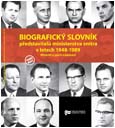 |
The publication of A Biographical Dictionary of Officials of the Ministry of the Interior in the Years 1948-1989. Ministers and Their Deputies is the result of a long-term research project pursued by historians at the Institute for the Study of Totalitarian Regimes. It presents a mosaic of 55 names/individuals who participated during the era of the communist regime to a lesser or larger extent in the activities and operations of the Ministry of the Interior on the territory of what is today the Czech Republic. For the period 1948-1989, the dictionary focuses on the ministers and deputy ministers of the Ministry of the Interior (the Ministry of National Security in the period 1950-1953) at the central, Czechoslovak level. After January 1969, the dictionary also considers three ministers of the interior of the Czech Socialist Republic. The book is supplemented with a detailed study devoted to the development of the Ministry of the Interior’s organisational structure. Institute for the Study of Totalitarian Regimes (ÚSTR), Prague 2010, 1st edition, bound publication, 232 pages, ISBN 978-80-87211-25-0 This publication is available only in Czech. |
Civic Forum, the first day. The establishment of the Civic Forum in documents and photographs
(Občanské fórum, den první. Vznik Občanského fóra v dokumentech a fotografiích)
Team of authors
I'm Sealing You All Inside My Heart. The Life Story of Josef Cardinal Beran
(Uzavírám vás do svého srdce. Životopis Josefa kardinála Berana)
Stanislava Vodičková
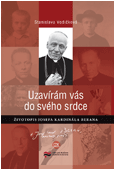 |
This publication deals with the fate of Josef Cardinal Beran (1888-1969) within the context of the contemporary history of the 20th century. It portrays Beran as a person solidly anchored in Christian values, who opposed two totalitarian regimes. During the period of the Nazi occupation, he ended up a prisoner in the Dachau concentration camp, and during the period of Communist rule he underwent incremental “domestic imprisonment,“ a fourteen-year internment under the surveillance of the State Security Service (Státní bezpečnost - StB) that ultimately resulted in his exile from his homeland without permission to return. The description of Beran’s life stages is supplemented by a wealth of period photographs and archive materials, most of which have never before been published. A CD with an authentic recording of Beran’s memoirs is also included. The book has been issued on the occasion of the 40th anniversary of the death of Josef Cardinal Beran in Rome. CDK, ÚSTR, 2009, 1st edition, hardcover, 400 pages, ISBN 978-80-7325-189-5 (Centrum demokracie a kultury – Center for Democracy and Culture), ISBN 978-80-87211-16-8 (Ústav pro studium totalitních režimů – Institute for the Study of Totalitarian Regimes) This publication is only available in Czech. |
We Came Into This World To Be Persecuted. Prison labor camps in the uranium mines, 1949-1961
(Přišli jsme na svět proto, aby nás pronásledovali. Trestanecké pracovní tábory při uranových dolech v letech 1949-1961)
Tomáš Bursík
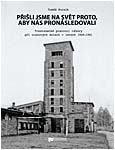 |
In this book, the author uses concrete cases to document the forms and methods that were in regular practice in Soviet prison labor camps as early as the 1920s, and which were likewise used in the system of the uranium “gulag” in Czechoslovakia. He addresses the mass deployment of prisoners in the uranium industry, the differentiated food rations, and the enforcing of rewards and punishments depending on the work output of the convicted. In many cases, the Czechoslovak communist dictatorship “learned” from its blood brother – the Nazi regime in neighboring Germany. ÚSTR, Prague 2009, 1st edition, hardcover, 212 pages, ISBN 978-80-87211-22-9 This publication is available only in Czech. |
Prague Through the Lens of the Secret Police
(Praha objektivem tajné policie)
Team of authors
Media Coverage:
- Prague from the Perspective of the Pathological Powerful (Foam Magazine, issue #22)
- “Secret Police Photos Evoke the Iron Curtain Era” (Archival Outlook: Newsletter of the Society of American Archivists, Jan/Feb 2010)
- Citizen spies, spied-on citizens. An exhibit of Czech secret-police photos from the Communist era, at Harvard through Dec. 21, shows Big Brother as unintentional artist (Harvard University Gazette, news.harvard.edu/gazette, 03-16 December 2009)
- 'Paparazzi de Estado' UN LIBRO REÚNE FOTOS TOMADAS POR LA POLICÍA SECRETA CHECOSLOVACA (Vanity Fair, 13/2009)
- When Prague Spied on Its Own (Roll Call, Washington, DC, September 14, 2009, www.rollcall.com)
- Praga Através das Lentes da Polícia Secreta (Canal de Moçambique, www.canalmoz.com, 8/12/2009)
- Kühle Blicke auf das Leben anderer (Neue Zürcher Zeitung, 7/24/ 2009)
- Big Brother’s Family Album. Secret police photographs evoke the oppression of communist Czechoslovakia (Prague Monitor Magazine; 03/2009)
- Coffee-table book with a difference collects photographs taken surreptitiously by communist-era secret police (www.radio.cz, 28 May 2009)
Victims of the Occupation. The Warsaw Pact Invasion of Czechoslovakia 21 August–31 December 1968
(Oběti okupace. Československo, 21. srpen – 31. prosinec 1968)
Milan Bárta, Lukáš Cvrček, Patrik Košický, Vítězslav Sommer
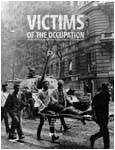 |
This publication presents as yet unpublished facts on the deaths of Czechoslovak citizens caused by members of Warsaw Pact forces in Czechoslovakia in 1968. The authors outline the political and military aspects of the invasion, describe the criminal activity of foreign soldiers and, through profiles, inquire into the fates of individual victims. ÚSTR, Prague 2009, 1st edition, 192 pages, Czech and English, ISBN 978-80-87211-12-0 |
Media Coverage:
- Soviet invasion´s victims finally have stories told (Czech Business Weekly, April 23, 2009)
- Soviet invasion up close (Prague Daily Monitor, 23 March 2009, praguemonitor.com)
- The everyday occupation (The Prague Post, 19 March 2009, www.praguepost.com)
Jan Palach ‘69
Petr Blažek, Patrik Eichler, Jakub Jareš
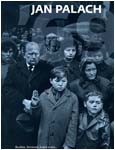 |
This book not only presents for the first time ever a detailed historical description of Palach’s story, but also expands on his theological, philosophical and artistic reflections and occupies itself with the fates of Palach’s successors and predecessors. An extensive series of archival documents and photographs and a DVD containing a group of six documentary and artistic films relating to the theme make up a part of the book. ÚSTR, FF UK, Togga, Prague 2009, 1st edition, 165 x 240 mm, 640 pages, Czech, ISBN 978-80-87211-04-5 This publication is available only in Czech. |
A Demagogue in the Party’s Service. Portrait of Politician and Ideologist Václav Kopecký
(Demagog ve službách strany. Portrét komunistického politika a ideologa Václava Kopeckého.)
Jana Pávová
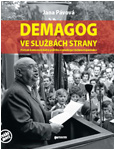 |
The book presents not only the life trajectory and political career of Václav Kopecký, one time Minister of Information and Culture, but also acquaints the reader in detail with his personality. The author maps Kopecký’s positions and behavior with the assistance of many citations and episodes from his life and a number of illustrative materials. ÚSTR, Prague 2009, 1st edition, 220 x 250 mm, 192 pages, Czech, ISBN 978-80-87211-09-0 This publication is available only in Czech. |
One of the Forgotten Men. Air Force Colonel Petr Uruba, Pilot of the 311th Czechoslovak Bombing Squadron, as a Guidebook through the “Short” 20th Century
(Jeden ze zapomenutých mužů. Plukovník letectva Petr Uruba, pilot 311. československé bombardovací perutě, jako průvodce „krátkým“ 20. stoletím)
Ladislav Kudrna
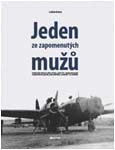 |
RAF pilot Petr Uruba serves as a guide not only through his own fate, but those of other Czechoslovak fliers, as well. For the first time the public is comprehensively presented with the problems of persecution of members of the Royal Air Force after February 1948. A preview to the bitter 1950s – into life in the shadow of the powerful State Security Service (StB), the beginnings of rehabilitation in the 1960s and a host of other new perspectives – is included. ÚSTR, Prague 2008, 1st edition, 230 x 287 mm, 304 pages, Czech, ISBN 978-80-87211-07-6 This publication is available only in Czech. |
The Border Guard Service and Attempts to Cross State Borders in the Years 1951–1955
(Pohraniční stráž a pokusy o přechod státní hranice v letech 1951–1955)
Pavel Vaněk
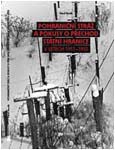 |
The book describes the development and structure of the Border Guard Service after 1948 through the example of the Cheb and Znojmo border brigades. It also deals with the impact of the border guards’ activity on the local population and describes the fates of those who tried to cross the state border. ÚSTR, Prague 2008, 1st edition, 165 x 240 mm, 216 pages, ISBN 978-80-87211-08-3 This publication is available only in Czech. Ohlasy v médiích: Grenzschutz in der fünfzigen Jahren (Landeszeitung, 11. 8. 2009) |









